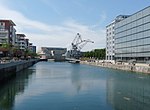École supérieure de biotechnologie Strasbourg
The French École supérieure de biotechnologie Strasbourg, also called European School of Biotechnology, Strasbourg (ESBS) is a scientific college situated in Illkirch (Greater Strasbourg). It was founded in 1982 as an autonomous institute within the University of Strasbourg and offers an international biotechnology program. In the year of 1988 the ESBS signed a convention on founding the European Confederation of the Upper Rhine Universities (German: Konvention zur Gründung einer Europäischen Konföderation der Oberrheinischen Universitäten, EUCOR), an initiative established by Professor Werner Arber, a Nobel Prize Laureate (Medicine) and Principal of the University of Basel, Switzerland. This makes it one of the Écoles Européennes des Universités du Rhin Supérieur (German: Europäische Schulen der Oberrheinischen Universitäten). Within the framework of this cooperation, the ESB Strasbourg is funded by: the Albert Ludwigs University of Freiburg im Breisgau, Germany the University of Basel, Switzerland the University of Strasbourg (formerly Université Louis Pasteur, responsible for administration of the ESBS), France
Excerpt from the Wikipedia article École supérieure de biotechnologie Strasbourg (License: CC BY-SA 3.0, Authors).École supérieure de biotechnologie Strasbourg
Rue Geiler de Kaysersberg, Strasbourg
Geographical coordinates (GPS) Address Nearby Places Show on map
Geographical coordinates (GPS)
| Latitude | Longitude |
|---|---|
| N 48.525555555556 ° | E 7.7377777777778 ° |
Address
Pôle API
Rue Geiler de Kaysersberg
67400 Strasbourg
Grand Est, France
Open on Google Maps






